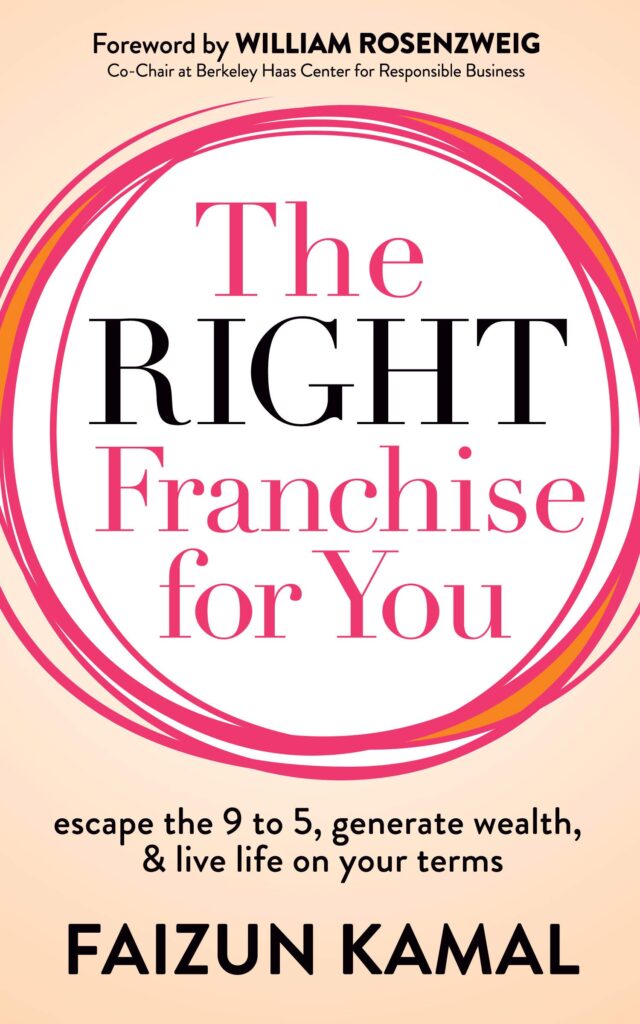A desire for freedom, meaning, and impact—not just income
A vision for generational wealth, aligned with their values
A life designed around their time, terms, and legacy
"I have always been curious about franchising but assumed that it was out of my reach. However, after attending one of Faizun’s workshops, I decided to take a chance and learn more and I am so glad that I did. With her warmth, humor and relatability, Faizun coached me through the process and gave me the tools required to make the choice that was in best alignment with my personal and professional goals. I know for a fact that I would not have been able to move forward in my franchise journey without her guidance and support."
“I had the pleasure of working with Faizun Kamal during a most unexpected career transition, and I can't recommend her highly enough. For starters, she literally wrote the book on the subject: “The RIGHT Franchise for YOU.” You could just read the book! But don’t! Faizun took the time understand my passions and values and never may a bad or even mediocre suggestion. Her balance of compassion and directness never failed, and the one time I though she’d erred in the direction of directness—it turns out she was right! Her guidance was instrumental in helping me make informed decisions, and her clear, consistent process allowed me to navigate the franchising path effectively. If you’re looking for someone who will listen, understand your vision, and guide you to the perfect franchise opportunity, Faizun is the expert—no PARTNER you need.”
"I would highly recommend contacting Faizun Kamal to anyone who is even remotely considering the possibility of starting a franchise business. I found her to be an excellent franchise consultant. She worked closely with me to help identify what I was looking for, suggested some great options to consider and then provided support throughout the evaluation and final selection stages. Along this journey, I learned some of her strengths that made for such an effective partnership. Among them, are her professionalism, knowledge of the franchise world, ability to ask the right probing questions and not only listen to the answers, but to use them in her efforts to further assist me. Lastly, she possesses a level of enthusiasm that makes it a joy to work with her."
"I have had the pleasure of working with Faizun in her role as a Franchise Consultant at The Franchise Pros and she is truly wonderful to work with! What sets Faizun apart from others in franchising is her commitment to understand each and every one of her client's unique goals. She listens carefully, provides personalized guidance, and has a genuine passion for helping others achieve their dreams. If you're considering entrepreneurship and would like to work with someone who combines industry-expertise and a thoughtful approach, you need to work with Faizun!"
"Working alongside Faizun has been an absolute pleasure. Together, we collaborated closely to award a franchise license to a truly deserving franchisee. Faizun consistently demonstrated integrity, clear communication, and a profound depth of knowledge throughout the entire journey. Our shared values and vision for this candidate ensured a seamless fit for our business. We deeply value Faizun's dedication and diligence in supporting this candidate from beginning to end! Thank you for all that you do, we look forward to collaborating again!"
"I’ve had to pleasure to work with Faizun on several occasions. She is an indescribable asset to both her clients and the franchise organizations she works with. Faizun has an amazing ability to ask the right questions and gain a solid understanding of her client’s short and long-term goals. She has the gift of matching her clients with franchise organizations that are a perfect fit. Faizun integrity is seen in every communication. She truly loves helping people find their dream business! If searching for an alternative to standard employment, I highly recommend making Faizun your first call."

That’s one of the biggest myths. While restaurant chains are highly visible, they’re just a fraction of the franchise world. Today, there are 3,000+ franchise brands across industries like education, fitness, wellness, senior care, home services, pet care, and more.